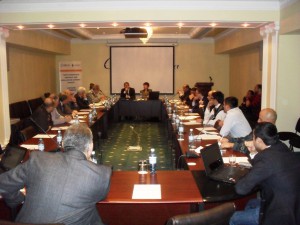TRANSPARENCY AZERBAIJAN AND “AZERSU” DISCUSSED TRANSPARENCY AND ACCOUNTABILITY IN WATER SUPPLY
Posted by: admin | Posted on: Апрель 23, 2013 Transparency Azerbaijan, with support from U.S. Agency for International Development (USAID), organized a discussion of successes and challenges in water supply. The roundtable was one in a series organized by Transparency Azerbaijan to facilitate dialogue between the government institutions and NGOs on ways to increase transparency and accountability. Representatives of the Ministry of Industry and Energy, Baku City Housing and Utilities Department, Prosecutor’s Office, Anti-corruption Commission, NGOs and International Organizations.
Transparency Azerbaijan, with support from U.S. Agency for International Development (USAID), organized a discussion of successes and challenges in water supply. The roundtable was one in a series organized by Transparency Azerbaijan to facilitate dialogue between the government institutions and NGOs on ways to increase transparency and accountability. Representatives of the Ministry of Industry and Energy, Baku City Housing and Utilities Department, Prosecutor’s Office, Anti-corruption Commission, NGOs and International Organizations.
The relevant government entities had made some efforts to improve supply of water to the population and reduce corruption in this area of service. The new initiatives include the improvement of appeal mechanisms and their transparency, new contracts with consumers, installation of meters, and etc.
The main goal of the roundtable was to identify and discuss current deficiencies in efforts to minimize corrupt practices in supply of water to the population, as well as to enhance safety standards in this sector, and also explore ways to increase transparency and accountability in this area.
During the event Hanver Abasov, Head of Commercial Department of Azersu OJSV, spoke about recent reforms in supply of water to the population of Azerbaijan. Alimamed Nuriyev, President of the Constitution Research Fund and coordinator of Information and Cooperation Network of Anti-corruption NGOs, discussed existing problems in consumer-supplier relations in provision of water to the population. Alekper Agasiyev, an expert on the utilities sector from the Constitution Research Fund, talked about typical violations of the consumer’s rights by water suppliers. Rena Safaralieva, Executive Director of Transparency Azerbaijan made general recommendations on improving transparency in water supply.
The participants praised the value in this exchange of views between government and civil society. They made some other recommendations and suggestions on the improving transparency and accountability in the area of water supply which will be submitted in writing to the respective agencies. Participants also addressed the media at the end of the event.

.jpg)
.jpg)
.jpg)
.jpg)
.jpg)
.jpg)
.jpg)
.jpg)
.jpg)
.jpg)
.jpg)
.jpg)
 D5 Creation
D5 Creation
Comments are Closed